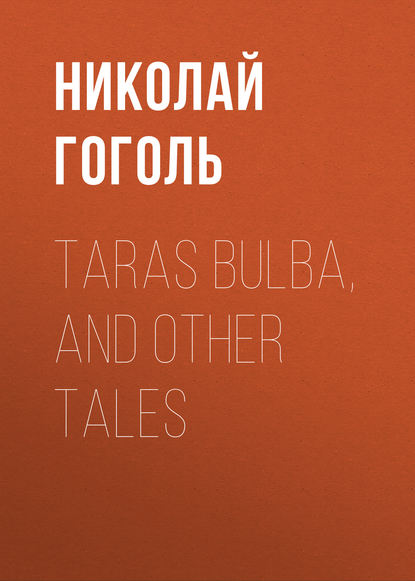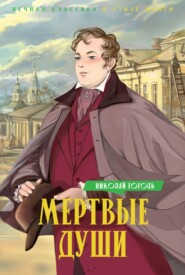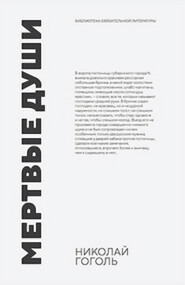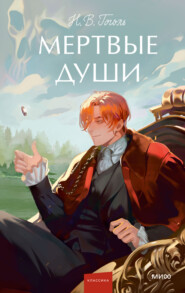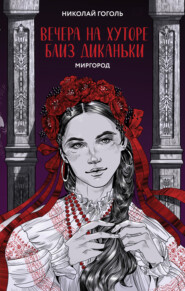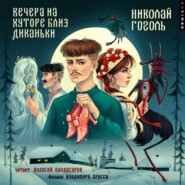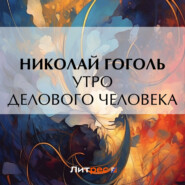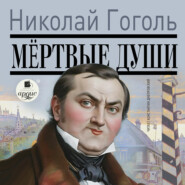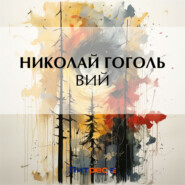По всем вопросам обращайтесь на: info@litportal.ru
(©) 2003-2025.
✖
Taras Bulba, and Other Tales
Год написания книги
2018
Настройки чтения
Размер шрифта
Высота строк
Поля
HOW A RECONCILIATION WAS SOUGHT TO BE EFFECTED AND A LAW SUIT ENSUED
“Ah! how do you do? Why do you irritate the dogs?” said Ivan Nikiforovitch, on perceiving Anton Prokofievitch; for no one spoke otherwise than jestingly with Anton Prokofievitch.
“Hang them! who’s been irritating them?” retorted Anton Prokofievitch.
“You have!”
“By Heavens, no! You are invited to dinner by Peter Feodorovitch.”
“Hm!”
“He invited you in a more pressing manner than I can tell you. ‘Why,’ says he, ‘does Ivan Nikiforovitch shun me like an enemy? He never comes round to have a chat, or make a call.’”
Ivan Nikiforovitch stroked his beard.
“‘If,’ says he, ‘Ivan Nikiforovitch does not come now, I shall not know what to think: surely, he must have some design against me. Pray, Anton Prokofievitch, persuade Ivan Nikiforovitch!’ Come, Ivan Nikiforovitch, let us go! a very choice company is already met there.”
Ivan Nikiforovitch began to look at a cock, which was perched on the roof, crowing with all its might.
“If you only knew, Ivan Nikiforovitch,” pursued the zealous ambassador, “what fresh sturgeon and caviare Peter Feodorovitch has had sent to him!” Whereupon Ivan Nikiforovitch turned his head and began to listen attentively. This encouraged the messenger. “Come quickly: Thoma Grigorovitch is there too. Why don’t you come?” he added, seeing that Ivan Nikiforovitch still lay in the same position. “Shall we go, or not?”
“I won’t!”
This “I won’t” startled Anton Prokofievitch. He had fancied that his alluring representations had quite moved this very worthy man; but instead, he heard that decisive “I won’t.”
“Why won’t you?” he asked, with a vexation which he very rarely exhibited, even when they put burning paper on his head, a trick which the judge and the chief of police were particularly fond of indulging in.
Ivan Nikiforovitch took a pinch of snuff.
“Just as you like, Ivan Nikiforovitch. I do not know what detains you.”
“Why don’t I go?” said Ivan Nikiforovitch at length: “because that brigand will be there!” This was his ordinary way of alluding to Ivan Ivanovitch. “Just God! and is it long?”
“He will not be there, he will not be there! May the lightning kill me on the spot!” returned Anton Prokofievitch, who was ready to perjure himself ten times in an hour. “Come along, Ivan Nikiforovitch!”
“You lie, Anton Prokofievitch! he is there!”
“By Heaven, by Heaven, he’s not! May I never stir from this place if he’s there! Now, just think for yourself, what object have I in lying? May my hands and feet wither!—What, don’t you believe me now? May I perish right here in your presence! Don’t you believe me yet?”
Ivan Nikiforovitch was entirely reassured by these asseverations, and ordered his valet, in the boundless coat, to fetch his trousers and nankeen spencer.
To describe how Ivan Nikiforovitch put on his trousers, how they wound his neckerchief about his neck, and finally dragged on his spencer, which burst under the left sleeve, would be quite superfluous. Suffice it to say, that during the whole of the time he preserved a becoming calmness of demeanour, and answered not a word to Anton Prokofievitch’s proposition to exchange something for his Turkish tobacco-pouch.
Meanwhile, the assembly awaited with impatience the decisive moment when Ivan Nikiforovitch should make his appearance and at length comply with the general desire that these worthy people should be reconciled to each other. Many were almost convinced that Ivan Nikiforovitch would not come. Even the chief of police offered to bet with one-eyed Ivan Ivanovitch that he would not come; and only desisted when one-eyed Ivan Ivanovitch demanded that he should wager his lame foot against his own bad eye, at which the chief of police was greatly offended, and the company enjoyed a quiet laugh. No one had yet sat down to the table, although it was long past two o’clock, an hour before which in Mirgorod, even on ceremonial occasions, every one had already dined.
No sooner did Anton Prokofievitch show himself in the doorway, then he was instantly surrounded. Anton Prokofievitch, in answer to all inquiries, shouted the all-decisive words, “He will not come!” No sooner had he uttered them than a hailstorm of reproaches, scoldings, and, possibly, even fillips were about to descend upon his head for the ill success of his mission, when all at once the door opened, and—Ivan Nikiforovitch entered.
If Satan himself or a corpse had appeared, it would not have caused such consternation amongst the company as Ivan Nikiforovitch’s unexpected arrival created. But Anton Prokofievitch only went off into a fit of laughter, and held his sides with delight at having played such a joke upon the company.
At all events, it was almost past the belief of all that Ivan Nikiforovitch could, in so brief a space of time, have attired himself like a respectable gentleman. Ivan Ivanovitch was not there at the moment: he had stepped out somewhere. Recovering from their amazement, the guests expressed an interest in Ivan Nikiforovitch’s health, and their pleasure at his increase in breadth. Ivan Nikiforovitch kissed every one, and said, “Very much obliged!”
Meantime, the fragrance of the beet-soup was wafted through the apartment, and tickled the nostrils of the hungry guests very agreeably. All rushed headlong to table. The line of ladies, loquacious and silent, thin and stout, swept on, and the long table soon glittered with all the hues of the rainbow. I will not describe the courses: I will make no mention of the curd dumplings with sour cream, nor of the dish of pig’s fry that was served with the soup, nor of the turkey with plums and raisins, nor of the dish which greatly resembled in appearance a boot soaked in kvas, nor of the sauce, which is the swan’s song of the old-fashioned cook, nor of that other dish which was brought in all enveloped in the flames of spirit, and amused as well as frightened the ladies extremely. I will say nothing of these dishes, because I like to eat them better than to spend many words in discussing them.
Ivan Ivanovitch was exceedingly pleased with the fish dressed with horse-radish. He devoted himself especially to this useful and nourishing preparation. Picking out all the fine bones from the fish, he laid them on his plate; and happening to glance across the table—Heavenly Creator; but this was strange! Opposite him sat Ivan Nikiforovitch.
At the very same instant Ivan Nikiforovitch glanced up also—No, I can do no more—Give me a fresh pen with a fine point for this picture! mine is flabby. Their faces seemed to turn to stone whilst still retaining their defiant expression. Each beheld a long familiar face, to which it should have seemed the most natural of things to step up, involuntarily, as to an unexpected friend, and offer a snuff-box, with the words, “Do me the favour,” or “Dare I beg you to do me the favour?” Instead of this, that face was terrible as a forerunner of evil. The perspiration poured in streams from Ivan Ivanovitch and Ivan Nikiforovitch.
All the guests at the table grew dumb with attention, and never once took their eyes off the former friends. The ladies, who had been busy up to that time on a sufficiently interesting discussion as to the preparation of capons, suddenly cut their conversation short. All was silence. It was a picture worthy of the brush of a great artist.
At length Ivan Ivanovitch pulled out his handkerchief and began to blow his nose; whilst Ivan Nikiforovitch glanced about and his eye rested on the open door. The chief of police at once perceived this movement, and ordered the door to be fastened. Then both of the friends began to eat, and never once glanced at each other again.
As soon as dinner was over, the two former friends both rose from their seats, and began to look for their hats, with a view to departure. Then the chief beckoned; and Ivan Ivanovitch—not our Ivan Ivanovitch, but the other with the one eye—got behind Ivan Nikiforovitch, and the chief stepped behind Ivan Ivanovitch, and the two began to drag them backwards, in order to bring them together, and not release them till they had shaken hands with each other. Ivan Ivanovitch, the one-eyed, pushed Ivan Nikiforovitch, with tolerable success, towards the spot where stood Ivan Ivanovitch. But the chief of police directed his course too much to one side, because he could not steer himself with his refractory leg, which obeyed no orders whatever on this occasion, and, as if with malice and aforethought, swung itself uncommonly far, and in quite the contrary direction, possibly from the fact that there had been an unusual amount of fruit wine after dinner, so that Ivan Ivanovitch fell over a lady in a red gown, who had thrust herself into the very midst, out of curiosity.
Such an omen forboded no good. Nevertheless, the judge, in order to set things to rights, took the chief of police’s place, and, sweeping all the snuff from his upper lip with his nose, pushed Ivan Ivanovitch in the opposite direction. In Mirgorod this is the usual manner of effecting a reconciliation: it somewhat resembles a game of ball. As soon as the judge pushed Ivan Ivanovitch, Ivan Ivanovitch with the one eye exerted all his strength, and pushed Ivan Nikiforovitch, from whom the perspiration streamed like rain-water from a roof. In spite of the fact that the friends resisted to the best of their ability, they were nevertheless brought together, for the two chief movers received reinforcements from the ranks of their guests.
Then they were closely surrounded on all sides, not to be released until they had decided to give one another their hands. “God be with you, Ivan Nikiforovitch and Ivan Ivanovitch! declare upon your honour now, that what you quarrelled about were mere trifles, were they not? Are you not ashamed of yourselves before people and before God?”
“I do not know,” said Ivan Nikiforovitch, panting with fatigue, though it is to be observed that he was not at all disinclined to a reconciliation, “I do not know what I did to Ivan Ivanovitch; but why did he destroy my coop and plot against my life?”
“I am innocent of any evil designs!” said Ivan Ivanovitch, never looking at Ivan Nikiforovitch. “I swear before God and before you, honourable noblemen, I did nothing to my enemy! Why does he calumniate me and insult my rank and family?”
“How have I insulted you, Ivan Ivanovitch?” said Ivan Nikiforovitch. One moment more of explanation, and the long enmity would have been extinguished. Ivan Nikiforovitch was already feeling in his pocket for his snuff-box, and was about to say, “Do me the favour.”
“Is it not an insult,” answered Ivan Ivanovitch, without raising his eyes, “when you, my dear sir, insulted my honour and my family with a word which it is improper to repeat here?”
“Permit me to observe, in a friendly manner, Ivan Ivanovitch,” here Ivan Nikiforovitch touched Ivan Ivanovitch’s button with his finger, which clearly indicated the disposition of his mind, “that you took offence, the deuce only knows at what, because I called you a ‘goose’—”
It occurred to Ivan Nikiforovitch that he had made a mistake in uttering that word; but it was too late: the word was said. Everything went to the winds. It, on the utterance of this word without witnesses, Ivan Ivanovitch lost control of himself and flew into such a passion as God preserve us from beholding any man in, what was to be expected now? I put it to you, dear readers, what was to be expected now, when the fatal word was uttered in an assemblage of persons among whom were ladies, in whose presence Ivan Ivanovitch liked to be particularly polite? If Ivan Nikiforovitch had set to work in any other manner, if he had only said bird and not goose, it might still have been arranged, but all was at an end.
He gave one look at Ivan Nikiforovitch, but such a look! If that look had possessed active power, then it would have turned Ivan Nikiforovitch into dust. The guests understood the look and hastened to separate them. And this man, the very model of gentleness, who never let a single poor woman go by without interrogating her, rushed out in a fearful rage. Such violent storms do passions produce!
For a whole month nothing was heard of Ivan Ivanovitch. He shut himself up at home. His ancestral chest was opened, and from it were taken silver rubles, his grandfather’s old silver rubles! And these rubles passed into the ink-stained hands of legal advisers. The case was sent up to the higher court; and when Ivan Ivanovitch received the joyful news that it would be decided on the morrow, then only did he look out upon the world and resolve to emerge from his house. Alas! from that time forth the council gave notice day by day that the case would be finished on the morrow, for the space of ten years.
Five years ago, I passed through the town of Mirgorod. I came at a bad time. It was autumn, with its damp, melancholy weather, mud and mists. An unnatural verdure, the result of incessant rains, covered with a watery network the fields and meadows, to which it is as well suited as youthful pranks to an old man, or roses to an old woman. The weather made a deep impression on me at the time: when it was dull, I was dull; but in spite of this, when I came to pass through Mirgorod, my heart beat violently. God, what reminiscences! I had not seen Mirgorod for twenty years. Here had lived, in touching friendship, two inseparable friends. And how many prominent people had died! Judge Demyan Demyanovitch was already gone: Ivan Ivanovitch, with the one eye, had long ceased to live.
I entered the main street. All about stood poles with bundles of straw on top: some alterations were in progress. Several dwellings had been removed. The remnants of board and wattled fences projected sadly here and there. It was a festival day. I ordered my basket chaise to stop in front of the church, and entered softly that no one might turn round. To tell the truth, there was no need of this: the church was almost empty; there were very few people; it was evident that even the most pious feared the mud. The candles seemed strangely unpleasant in that gloomy, or rather sickly, light. The dim vestibule was melancholy; the long windows, with their circular panes, were bedewed with tears of rain. I retired into the vestibule, and addressing a respectable old man, with greyish hair, said, “May I inquire if Ivan Nikiforovitch is still living?”
At that moment the lamp before the holy picture burned up more brightly and the light fell directly upon the face of my companion. What was my surprise, on looking more closely, to behold features with which I was acquainted! It was Ivan Nikiforovitch himself! But how he had changed!
“Are you well, Ivan Nikiforovitch? How old you have grown!”
“Yes, I have grown old. I have just come from Poltava to-day,” answered Ivan Nikiforovitch.
“You don’t say so! you have been to Poltava in such bad weather?”
“What was to be done? that lawsuit—”
At this I sighed involuntarily.





